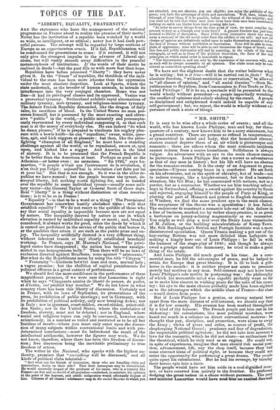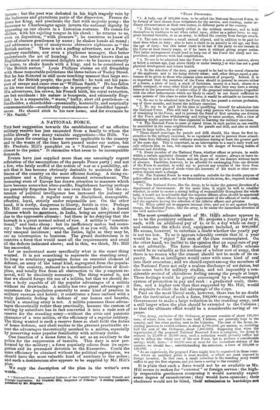"MR. SMITH."
IT is easy to be wise after a whole series of events ; and all the world, who has known Louis Philippe, man and boy, for three- quarters of a century, now knows him to be a sorry statesman, but a grand contriver. There are persons so refined in temperament, so symmetrical in mind and body, that the homeliest circum- stances cannot deprive them of an air which is picturesque and romantic : there are others whom the roost romantic incidents cannot redeem from a coarse homeliness. Selfishness is always vulgar. An adventurer with an eye to the main chance cannot be picturesque. Louis Philippe has run a career as adventurous- as that of any man in history ; but his life will have no charms for the romance-reader. It is the story of an Argonaut in green spectacles—Ulysses coming home in a comforter. He set forth on his adventures, not in the spirit of chivalry, but of trade—not to redress wrongs, like a knight-errant, but to find a lucrative situation, like Gil Bias; he has communed with nations, not as a patriot, but as a contractor. Whether we see him teaching school- boys in Switzerland, offering a sword against his country to Spain, and rejected, engaging hiniselfto the people of Paris as King, or playing the part of Monarch and patron to English deputations at Windsor, we find the same prudent eye to the main chance. His acceptance of the, throne was a:•.speculation : it has failed. The endeavour Ed construct a romantic tale-out -of this failure in a line of business, marked too by rather sharp practice, is as great a burlesque on penny-a-lining magnanimity as we remember. You might as well drop a tear-over the Drury Lane vicissitudes of M. .Jullien, or the building- miscalculations of Kemp Town. Mr. Silk Buckingham's British and Foreign Institute was a more disinterested speculation. Queen Titania making a pet out of the hay-eating Bottom was not more deluded than Lafayette in. making a kingly hero out of Louis Philippe: he fell in with the humour of the stage-play of 1830; and though he always owed a grudge against the mummery, he tried to make a good thing of the estate. And Louis Philippe did much good in his time. As a com- mercial man, he felt the advantages of peace, and•he helped to retain for Europe that great blessing. It is ill to look a gift- horse in the mouth : it is neither proper nor acute to presume merely bad motives in any man. Self-interest may not have been Louis Philippe's sole motive in postponing 'War: the philosophy of which his mercantile mind was capable probably went so far as to make him sincere in wishing peace for the sake of his coun- try: his eye to the main chance probably made him keen-sighted as to the advantages which the middle class of France—las class —would derive from peace.
But if Louis Philippe has a genius, or strong natural bent apart from the mere dictates of self-interest, we should say that it is for low comedy. His evasion has been marked throughout by a kind of dry humour. The French people put him out in his reckoning : his calculations, like most political mistakes, were based too much in a reliance on direct conventional motives: he thought that pay, discipline, and promotion, were alone to sway the Army ; views of peace and order, as sources of profit, the shopkeepmg National Guard; prudence and fear of degradation, the respectable political agitators: he did not take into account a love for the romantic, which he did not share—an enthusiasm for the theatrical, which he only used as an engine. He could not, in spite of experiences, imagine that men should risk social posi- tion, advancement, life, nay the shop itself, because they had some abstract ideas of political right, or because they could not resist the opportunity for performing a great drama. The people quite upset his calculations. But he had his revenge, by turning their heroic epic into a farce.
The people would have set him aside in a cool dignified man- ner, or have escorted him politely to the frontier. He preferred dodging the great nation in a chace without pursuers. The !met and minister Lamartine would have read him an exalted farewell lecture : but the poet was defeated in his high tragedy vein by the ludicrous and gratuitous panic of the dispersion. France de- poses her King, and proclaims the fact with majestic pomp : the successor to Charlemagne again inverts the national dignity by appearing on our shores in a Listonian costume. He comes for shelter, with his cajoling tongue in his cheek; he returns to us, even on deposition, "with pleasure"; he contrives to know all sorts of obscure gentlemen by name ; he shakes hands all round ; and addresses a knot of anonymous obtrusive sightseers as "the British nation." There is not a puffing advertiser, nor a Parlia- mentarycaudidate nor even a playhouse manager, that better understands the art -of humbug.. No one better knows that an Englishman's most esteemed delights are—to be known correctly by name, to shake hands with a king, and to be considered as "the British nation." Louis Philippe claims an old friendship with those respectable politicians the three tailors of Tooley Street. But he has flattered in still more touching manner that large sec- tion of the British people, the yens Smith : he took out his pass- port of escape and came over as "William Smith." He has fallen on his true social designation---he is properly one of the Smiths. His adventures, his crown, his French birth, his royal extraction, are but accidents : his nature is bourgeois, nd eminently Eng- lish : he is a respectable, "warm," bulky, alert old gentleman—a fundholder, a shareholder—prosaically, materially, and sceptically commonsensible—comfortably contemptuous of dandified appear- ances. He should stick to his new name, and for evermore be "Mr Smith."



























 Previous page
Previous page